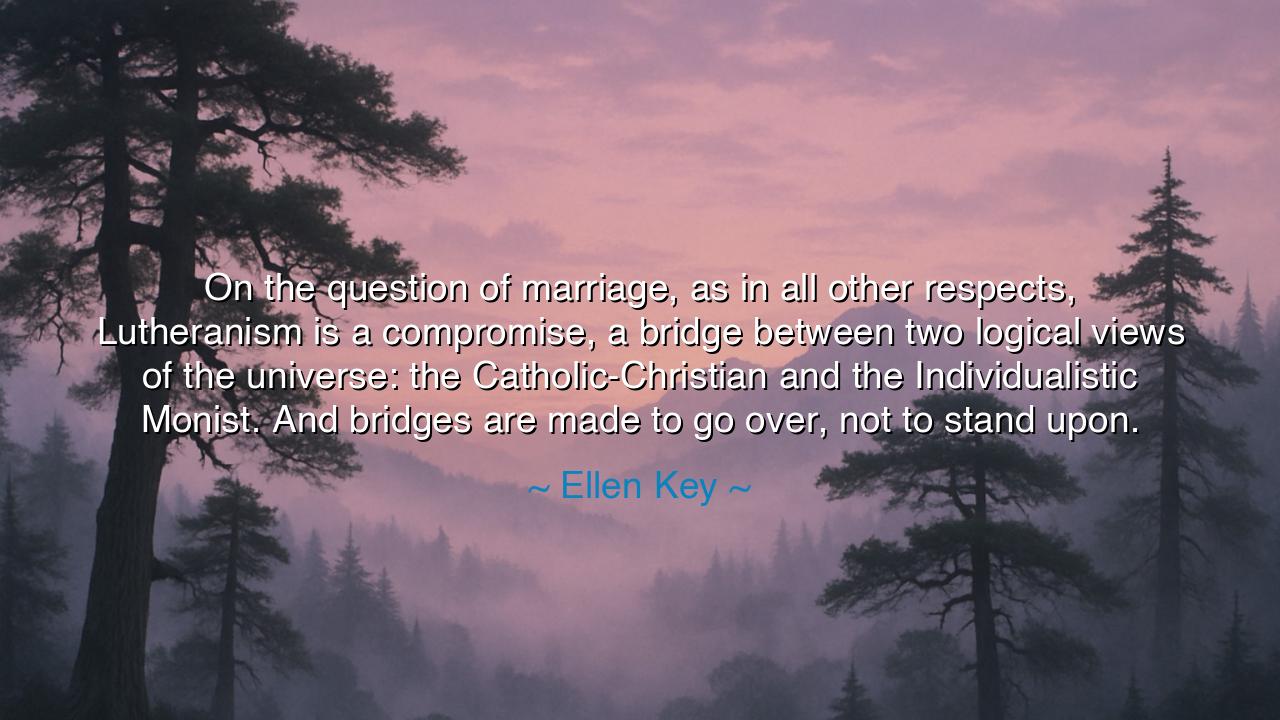
On the question of marriage, as in all other respects
On the question of marriage, as in all other respects, Lutheranism is a compromise, a bridge between two logical views of the universe: the Catholic-Christian and the Individualistic Monist. And bridges are made to go over, not to stand upon.






In the words of Ellen Key, “On the question of marriage, as in all other respects, Lutheranism is a compromise, a bridge between two logical views of the universe: the Catholic-Christian and the Individualistic Monist. And bridges are made to go over, not to stand upon.” These words hold the weight of both philosophy and history. Key, the Swedish thinker who wrestled with questions of love, freedom, and religion, here unveils a truth about systems of belief and the institutions they shape. Marriage, she reminds us, has always been both sacred and contested, both spiritual and social. In Lutheranism, she sees not a final answer, but a passage, a middle way between two mighty visions of the world.
The Catholic-Christian view, rooted in tradition, holds marriage as sacrament—a divine covenant that binds not only two souls but entire families and communities under the gaze of God. It exalts permanence and obedience, placing the institution above individual desire. The Individualistic Monist view, by contrast, sees marriage as a private choice, an extension of personal freedom, a union bound not by heaven’s decree but by inner necessity. Between these two poles, Lutheranism stands, not as a fortress, but as a bridge, carrying elements of both but never fully embodying either.
Key’s insight is sharp: “And bridges are made to go over, not to stand upon.” A bridge is not a destination, but a means of passage. To live forever upon a bridge is to remain in the middle, never arriving at one shore or the other. She warns that Lutheranism, in its compromises, may serve a transitional purpose, but cannot be a final resting place. For the human soul, she suggests, must eventually choose: either to embrace marriage as eternal sacrament, or to claim it as the free expression of individual will. A compromise may ease tension for a time, but it cannot forever resolve the great contradictions of existence.
History gives us a vivid example of this truth. When Martin Luther himself broke with Rome, he rejected the Catholic idea of marriage as sacrament, declaring it instead a social estate, ordained by God but not holy in itself. He married Katharina von Bora, a former nun, and together they embodied a new model of household life: pious, practical, rooted in family and work. Yet this was not the radical freedom of the Individualistic Monist, for marriage still carried religious weight and social duty. Luther’s reform was thus indeed a bridge—a break from Catholic sacramentalism, but not a leap into pure individualism.
The ancients, too, understood the peril of compromise. Aristotle spoke of the “golden mean,” but warned that virtue is not always found in the middle of extremes. Sometimes the middle path is wisdom; other times it is avoidance of truth. Ellen Key recognized this danger in Lutheranism’s compromise on marriage: it gave enough to tradition to preserve order, enough to individuality to acknowledge freedom, but left unresolved the deeper question—what is the true essence of human union? Is it duty, or is it freedom? Is it sacrament, or is it choice?
The deeper meaning of Key’s words is not only about marriage or Lutheranism, but about all compromise. Bridges are necessary, for they carry us from one shore to another. But woe to those who mistake the bridge for a home. To cling forever to the middle path is to remain unsettled, to never know the fullness of conviction or the peace of clarity. Compromise may be wise in times of conflict, but it cannot be the eternal resting place of the soul.
The lesson for us is clear: in matters of life and spirit, do not remain forever upon the bridge. Marriage, like all great institutions, must be chosen with conviction, either as sacred covenant or as free partnership, but not as half-measure. Faith, too, must grow beyond compromise into belief. And life itself demands that we move forward, crossing the bridges of transition, but continuing until we find the solid ground of truth.
Practical actions follow from this wisdom. Examine the bridges in your own life—compromises, half-decisions, temporary arrangements—and ask whether they are serving as passage or prison. Do not mistake convenience for truth, but seek clarity in love, in faith, and in duty. Respect compromise when it is necessary, but do not idolize it. And above all, have the courage to cross over, to choose your path fully, so that your life is lived not upon a bridge, but upon the firm ground of conviction and meaning.
Thus, Ellen Key’s words stand as a reminder that compromise has its purpose, but destiny demands decision. Lutheranism’s bridge on marriage was a gift for its time, but bridges are not for dwelling—they are for crossing. Let us then pass on this wisdom: in marriage, in faith, in life itself, do not linger forever in the middle. Cross over, and live fully on the shores of truth.






AAdministratorAdministrator
Welcome, honored guests. Please leave a comment, we will respond soon